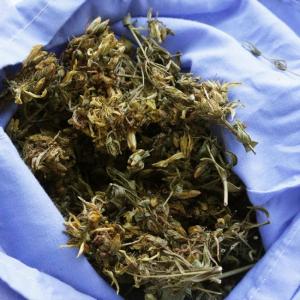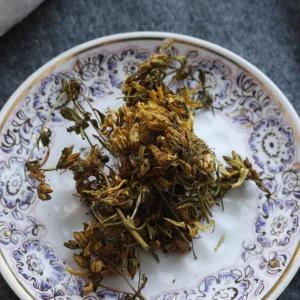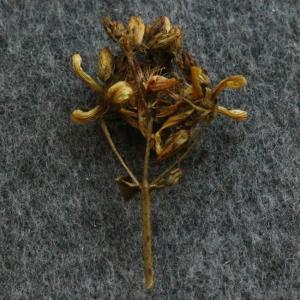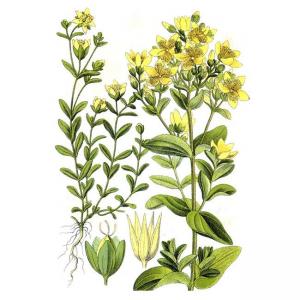
ST JOHNS WORT FLOWERS (HYPERICUM PERFORATUM) - PLANTS

BASE / GENERAL DATA
Information submited: November 6, 2017 Modified: May 16, 2018 By: OperaDreamhouse
Botanical Name: Hypericum Perforatum
Botanical Origin: Europe and Asia
Part Typically Used: Flowers, stems, leaves
Common name: Saint John's wort, St John's wort, perforate St John's wort, Goatweed.
Hypericum Perforatum is a flowering plant in the family Hypericaceae. The common name "St John's Wort" may be used to refer to any species of the genus Hypericum.
Hypericum Perforatum is native to parts of Europe and Asia but has spread to temperate regions worldwide as a cosmopolitan invasive weed.
The common name "St John's Wort" comes from its traditional flowering and harvesting on St John's Day, 24 June. The genus name Hypericum is derived from the Greek words Hyper (Above) and Eikon (Picture), in reference to the tradition of hanging plants over religious icons in the home during St John's Day, to ward off evil.
St John’s Wort is distinguished by its almost woody base, opposite leaves, bright yellow flowers, and leaves with transparent dots. This plant can grow to 1 metre high. St John’s wort blooms from June to August.
St John’s wort flowers are bright yellow. Numerous flower clusters are at ends of branches with each flower measuring about 2 cm across. It has five yellow petals with several, small, black dots along the margins; it also has many stamens in 3 clusters and a single pistil in the centre.
The flowers and herb are picked during the summer months traditionally the week following 24th June. They can then be dried at a medium temperature in the shade. An infusion can be made from adding the dried herb to boiling water.
Traditionally used as a tea, sometimes available in tea bags. Also used to make a red St John's oil for use in liniments and lotions, but only from fresh material. May also be administered as a capsule or extract for convenience.
Botanical Origin: Europe and Asia
Part Typically Used: Flowers, stems, leaves
Common name: Saint John's wort, St John's wort, perforate St John's wort, Goatweed.
Hypericum Perforatum is a flowering plant in the family Hypericaceae. The common name "St John's Wort" may be used to refer to any species of the genus Hypericum.
Hypericum Perforatum is native to parts of Europe and Asia but has spread to temperate regions worldwide as a cosmopolitan invasive weed.
The common name "St John's Wort" comes from its traditional flowering and harvesting on St John's Day, 24 June. The genus name Hypericum is derived from the Greek words Hyper (Above) and Eikon (Picture), in reference to the tradition of hanging plants over religious icons in the home during St John's Day, to ward off evil.
St John’s Wort is distinguished by its almost woody base, opposite leaves, bright yellow flowers, and leaves with transparent dots. This plant can grow to 1 metre high. St John’s wort blooms from June to August.
St John’s wort flowers are bright yellow. Numerous flower clusters are at ends of branches with each flower measuring about 2 cm across. It has five yellow petals with several, small, black dots along the margins; it also has many stamens in 3 clusters and a single pistil in the centre.
The flowers and herb are picked during the summer months traditionally the week following 24th June. They can then be dried at a medium temperature in the shade. An infusion can be made from adding the dried herb to boiling water.
Traditionally used as a tea, sometimes available in tea bags. Also used to make a red St John's oil for use in liniments and lotions, but only from fresh material. May also be administered as a capsule or extract for convenience.

SPIRITUAL PRACTISES DATA

MEDICINE / HEALTH DATA
Information submited: November 6, 2017 Modified: May 16, 2018 By: OperaDreamhouse
Therapeutic Properties:
Analgesic
Antiseptic
Antispasmodic
Aromatic
Astringent
Cholagogue
Digestive
Diuretic
Expectorant
Nervine
Resolvent
Sedative
Stimulant
Vulnerary
Contraindications: Not to be used during phototherapy. Fair-skinned persons should avoid excessive exposure to sunlight during use. May decrease the blood levels of certain orally administered drugs.
St John's Wort is associated with aggravating psychosis in people who have schizophrenia.
Should not be taken by women on contraceptive pills as it upregulates the CYP3A4 cytochrome of the P450 system in the liver. Combining estrogen containing oral contraceptives with St John's wort can lead to decreased efficacy of the contraceptive and eventually unplanned pregnancies.
St. John's Wort has been known to decrease the blood concentrations of immunosuppressants (cyclosporine & tacrolimus), sedatives (midazolam & alprazolam), anticoagulants (phenprocoumon), chemotherapy drugs (irinotecan) and other medications.
It is also known to decrease the efficacy of HIV medications, cholesterol medications, as well as transplant medications.
Antiseptic
Antispasmodic
Aromatic
Astringent
Cholagogue
Digestive
Diuretic
Expectorant
Nervine
Resolvent
Sedative
Stimulant
Vulnerary
Contraindications: Not to be used during phototherapy. Fair-skinned persons should avoid excessive exposure to sunlight during use. May decrease the blood levels of certain orally administered drugs.
St John's Wort is associated with aggravating psychosis in people who have schizophrenia.
Should not be taken by women on contraceptive pills as it upregulates the CYP3A4 cytochrome of the P450 system in the liver. Combining estrogen containing oral contraceptives with St John's wort can lead to decreased efficacy of the contraceptive and eventually unplanned pregnancies.
St. John's Wort has been known to decrease the blood concentrations of immunosuppressants (cyclosporine & tacrolimus), sedatives (midazolam & alprazolam), anticoagulants (phenprocoumon), chemotherapy drugs (irinotecan) and other medications.
It is also known to decrease the efficacy of HIV medications, cholesterol medications, as well as transplant medications.
Pregnancy / Lactation: Recommend to consult with a qualified healthcare practitioner before using herbal products, particularly if you are pregnant, nursing, or on any medications.
Children: It has been used in children to control bed-wetting, mild depression, as a topical agent for the relief of pain from skin infections such as dermatitis, and in drops for ear pain associated with an ear infection.
Guidelines: No matter how much this herb has blocked the action of drugs in the body, St. John's Wort is a very beloved in herbalist world. It is a very effective herbal remedy.
Children: It has been used in children to control bed-wetting, mild depression, as a topical agent for the relief of pain from skin infections such as dermatitis, and in drops for ear pain associated with an ear infection.
Guidelines: No matter how much this herb has blocked the action of drugs in the body, St. John's Wort is a very beloved in herbalist world. It is a very effective herbal remedy.
Common St. John's-Wort has long been used in herbalism. It was known to have medical properties in Classical Antiquity and was a standard component of theriacs.
Hepericum Perforatum is one of many species known commonly as St John's Wort, and is the species most commonly associated with herbal medicine.
It is a medicinal herbwith antidepressant activity and potent anti-inflammatory properties. St John's Wort helps promotes a healthy mood and emotional balance.
A major constituent chemical in herb, hyperforin, may be useful for treatment of alcoholism, although dosage, safety and efficacy have not been studied. Hyperforin has also displayed antibacterial properties against Gram-positive bacteria, although dosage, safety and efficacy has not been studied.
In ancient times, St John’s Wort was used as a sedative and to treat malaria. It was also used as a balm for wounds, burns and insect bites.
A major constituent chemical in herb, hyperforin, may be useful for treatment of alcoholism, although dosage, safety and efficacy have not been studied. Hyperforin has also displayed antibacterial properties against Gram-positive bacteria, although dosage, safety and efficacy has not been studied.
In ancient times, St John’s Wort was used as a sedative and to treat malaria. It was also used as a balm for wounds, burns and insect bites.

BEAUTY / COSMETICS DATA

FOOD / COOKING DATA
COMMENTS
No comments.






